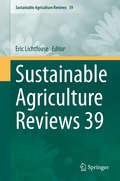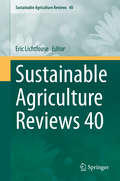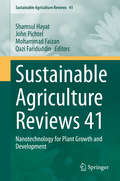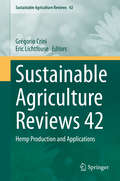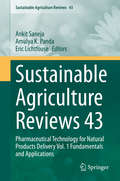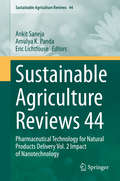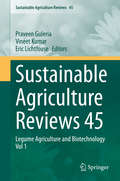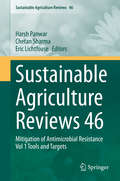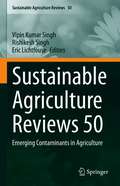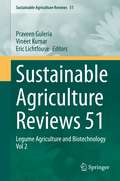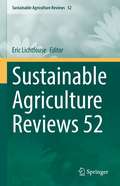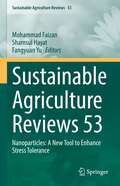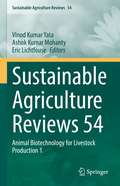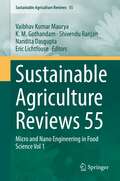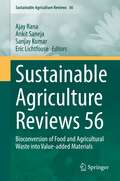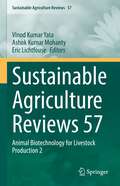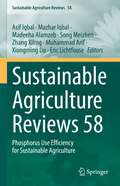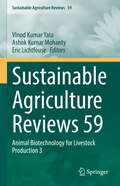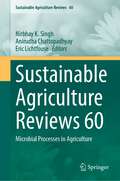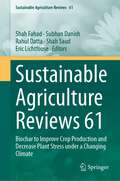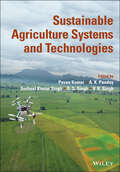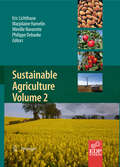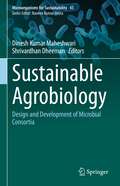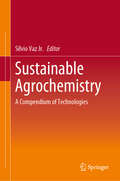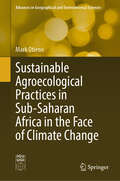- Table View
- List View
Sustainable Agriculture Reviews 39 (Sustainable Agriculture Reviews #39)
by Eric LichtfouseThis book reviews recent research advances in sustainable agriculture, with focus on crop production, biodiversity and biofuels in Africa and Asia.
Sustainable Agriculture Reviews 40 (Sustainable Agriculture Reviews #40)
by Eric LichtfouseThis book reviews recent research advances in sustainable agriculture, with focus on crop production, biodiversity and biofuels in Africa and Asia.
Sustainable Agriculture Reviews 41: Nanotechnology for Plant Growth and Development (Sustainable Agriculture Reviews #41)
by John Pichtel Shamsul Hayat Mohammad Faizan Qazi FariduddinThis book presents recent developments involving the role of nanoparticles on plant physiology and growth. Nanotechnology applications include improvement of agricultural production using bio-conjugated NPs (encapsulation), transfer of DNA in plants for development of insect pest-resistant varieties, nanoformulations of agrochemicals such as pesticides and fertilizers for crop improvement, and nanosensors/nanobiosensors in crop protection for identification of diseases and residues of agrochemicals. Recent findings on the increased use of nanotechnology in agriculture by densely populated countries such as China and India indicate that this technology may impart a substantial impact on reducing hunger, malnutrition, and child mortality.
Sustainable Agriculture Reviews 42: Hemp Production and Applications (Sustainable Agriculture Reviews #42)
by Grégorio Crini Eric LichtfouseThis book reviews recent research and applications, developments, research trends, methods and issues related to the applications of industrial hemp for fundamental research and technology.
Sustainable Agriculture Reviews 43: Pharmaceutical Technology for Natural Products Delivery Vol. 1 Fundamentals and Applications (Sustainable Agriculture Reviews #43)
by Ankit Saneja Amulya K. Panda Eric LichtfouseThis edited book comprises of eight chapters dealing on various aspects of pharmaceutical technology for delivery of natural products. Book chapters deal with the solubility and bioavailability enhancement technologies for natural products. Emphasis has also been given on the significance of delivery strategies for improving the therapeutic efficacy of paclitaxel, galantamine and tea constituents.
Sustainable Agriculture Reviews 44: Pharmaceutical Technology for Natural Products Delivery Vol. 2 Impact of Nanotechnology (Sustainable Agriculture Reviews #44)
by Ankit Saneja Amulya K. Panda Eric LichtfouseThis book covers nanotechnology based approaches for improving the therapeutic efficacy of natural products. It critically explores lipid nanoarchitectonics, inorganic particles and nanoemulsion based tools for delivering them. With its chapters from eminent experts working in this discipline, it is ideal for researchers and professionals working in the area.
Sustainable Agriculture Reviews 45: Legume Agriculture and Biotechnology Vol 1 (Sustainable Agriculture Reviews #45)
by Praveen Guleria Vineet Kumar Eric LichtfouseLegumes are a major constituent of vegetarian diets and alleviate malnutrition because they are protein-rich and easily digestible. Moreover, a legume-based diet is much more sustainable than a meat-based diet. Recent research has disclosed major advances in legume agriculture and biotechnology, leading to improved health benefits from nutrients, antioxidants, polyphenolic phytochemicals, phenolic acids, flavonoids and tannins. This book reviews bioactive compounds and their applications, and conventional breeding and biotechnology for legume sustainability and nutritional enhancement.
Sustainable Agriculture Reviews 46: Mitigation of Antimicrobial Resistance Vol 1 Tools and Targets (Sustainable Agriculture Reviews #46)
by Harsh Panwar Chetan Sharma Eric LichtfouseAccording to the World Health Organization, antimicrobial resistance is a major threat to global health because the number of alternative antibiotics is very limited. Antimicrobial resistance is a slow evolutionary process that has been accelerated by human activities in health, environment and agriculture sectors. Due to their wide application, antibiotics and their residues have been found in almost all food products and natural ecosystems. This book reviews the drivers, impact and mitigation of antimicrobial resistance, with focus on methods and targets.
Sustainable Agriculture Reviews 50: Emerging Contaminants in Agriculture (Sustainable Agriculture Reviews #50)
by Vipin Kumar Singh Rishikesh Singh Eric LichtfouseThis book reviews contaminants of emerging nature affecting the agroecosystem and includes important information regarding the their sources, types, transportation, environmental threats and strategies to decontaminate the affected agroecosystems. The contents of this volume will help the policy makers and environmental engineers in combating the continuously rising threats to cultivated ecosystems.
Sustainable Agriculture Reviews 51: Legume Agriculture and Biotechnology Vol 2 (Sustainable Agriculture Reviews #51)
by Praveen Guleria Vineet Kumar Eric LichtfouseIn the context of climate change, pollution and food safety, the current challenge is to enhance legumes production to sustain the growing population needs by 2050. This is a daunting task because abiotic and biotic stresses are threatening the growth, survival and productivity of legumes. For instance, the productivity of legumes is documented to be reduced by 14-88% by abiotic stresses. The co-occurrence of abiotic and biotic stresses under field conditions leads to interactive stress types, thus yielding positive or negative outcomes. Legumes react using antioxidant defense, osmoregulatory adjustments, hormonal regulations and molecular mechanisms to tolerate stress. Hence, improving legume productivity requires knowledge on the sensitivity, mechanisms and approaches of stress tolerance in legumes, in order to design new crops and alternative management systems. This book presents advances on bioactive compounds, applications, effect of various stresses and biotechnology-based stress tolerance mechanisms of legumes. This is our second volume on Legume Agriculture and Biotechnology, published in the series Sustainable Agriculture Reviews.
Sustainable Agriculture Reviews 52 (Sustainable Agriculture Reviews #52)
by Eric LichtfouseThis book presents advanced knowledge and techniques to improve food quality, such as organic farming, fertilization using waste, reducing arsenic in food, soil restoration, forage production in arid regions and weed control. Agriculture is actually facing two major challenges, feeding an ever-growing population and providing safe food in the context of pollution, climate change and the future circular economy.
Sustainable Agriculture Reviews 53: Nanoparticles: A New Tool to Enhance Stress Tolerance (Sustainable Agriculture Reviews #53)
by Shamsul Hayat Mohammad Faizan Fangyuan YuThis book presents recent developments involving the role of nanoparticles on stress tolerance. In particular, nanoparticles have the potential to provide effective solutions to the multiple agriculture-related problems. Nanoparticles present enhanced reactivity and thus better effectiveness when compared to their bulkier counterparts due to their higher surface-to-volume ratio.
Sustainable Agriculture Reviews 54: Animal Biotechnology for Livestock Production 1 (Sustainable Agriculture Reviews #54)
by Vinod Kumar Yata Ashok Kumar Mohanty Eric LichtfouseThis book reviews concepts and recent advances of biotechnological approaches for livestock production. Indeed, biotechnologies have recently emerged as powerful tools for animal breeding, genetics, production, nutrition, and animal health. Applications to the production of livestock such as cattle, camel, and poultry are detailed. Chapters also present biotechnological applications for diagnostics, animal nutrition, and animal food production.
Sustainable Agriculture Reviews 55: Micro and Nano Engineering in Food Science Vol 1 (Sustainable Agriculture Reviews #55)
by Vaibhav Kumar Maurya K. M. Gothandam Shivendu Ranjan Nandita Dasgupta Eric LichtfouseThis book provides up to date information on the emerging trends and technology in food nanotechnology. It gives high-quality literature focused on the recent developments, research trends, methods and issues related to the safe use of nanoscale materials to add value to food. Most importantly, this book encloses critical reviews on micro and nanoengineering concepts, principles and applications in food. It also provides a scientific basis of micro and nanoengineered structures and compounds, their industrial food applications, encapsulation techniques and methods. This book encompasses detection, analysis and characterization techniques for nanostructures, the fate of encapsulated materials in target food. It also educates on regulatory issues and safety of clinical translation of nanomaterials in fortified foods.
Sustainable Agriculture Reviews 56: Bioconversion of Food and Agricultural Waste into Value-added Materials (Sustainable Agriculture Reviews #56)
by Eric Lichtfouse Sanjay Kumar Ankit Saneja Ajay RanaThis book reviews the sources, extraction, processing and applications of value-added compounds from agro-waste, with a focus on drug delivery, tea, apple pomace, lignin nanocomposites, bioethanol, fertilizers and sitosterol. Food residues provide bioactive molecules, enzymes, vitamins, antioxidants, and animal feed.
Sustainable Agriculture Reviews 57: Animal Biotechnology for Livestock Production 2 (Sustainable Agriculture Reviews #57)
by Vinod Kumar Yata Ashok Kumar Mohanty Eric LichtfouseThis 2nd book provides fundamental concepts and recent applications of biotechnological methods, such as genetic selection, breeding methods and genetic engineering tools. Biotechnology has remarkably improved the productivity of livestock by increasing the reproduction efficiency and decreasing the generation time. The chapters detail the mechanisms of methods for animal reproduction and breeding methods. This book focus on the impact of minerals, steroids metabolic stress, nutritional stress and anti-nutritional factors on the livestock reproduction.
Sustainable Agriculture Reviews 58: Phosphorus Use Efficiency for Sustainable Agriculture (Sustainable Agriculture Reviews #58)
by Asif Iqbal Mazhar Iqbal Madeeha Alamzeb Song Meizhen Zhang Xiling Muhammad Arif Xiongming Du Eric LichtfouseThis book presents recently-developed crop, soil, and management practices that can be used to improve phosphorous use efficiency in agriculture. Food security highly depends on the availability of plant nutrients such as phosphorus, yet rock phosphate reserves are expected to be exhausted in the next 50–100 years. Moreover, about 80% of the phosphorous fertilizers applied to soils become unavailable to plants due to phosphorous fixation in iron and aluminum oxides in acidic soils and with carbonates in alkaline soils. As a consequence, only 10-15% of applied phosphorous is up taken by crops. Therefore, there is a need for advanced practices for improving phosphorus use efficiency.
Sustainable Agriculture Reviews 59: Animal Biotechnology for Livestock Production 3 (Sustainable Agriculture Reviews #59)
by Vinod Kumar Yata Ashok Kumar Mohanty Eric LichtfouseThe dependency on animal biotechnology in livestock industries has been increased in the recent past. The livestock production research has witnessed remarkable developments on biotechnological methods to produce the elite animal breeds. The global animal food requirement has been steadily increasing, and animal production needs to be increased as per the global needs. This book covers various aspects of animal biotechnology such as, reproductive biotechnologies in sheep and goats, oogenesis and folliculogenesis and ovarian disorders. This book focusses the discussion on proteomics and metabolomics, and separate chapters were dedicated to discuss these topics. The proteomics studies of animal viruses were discussed in this book, and this would be helpful to understand animal viral pathogenesis. The applications of metabolomics in livestock were discussed with focus on data analysis, identification of unknown compounds. The purpose of this book is to provide the recent research trends, and convert all this information to usable guide to professionals, researchers and students who are working the research area of animal biotechnology.
Sustainable Agriculture Reviews 60: Microbial Processes in Agriculture (Sustainable Agriculture Reviews #60)
by Nirbhay K. Singh Anirudha Chattopadhyay Eric LichtfouseIn the context of rising adverse effects of climate change on agriculture, there is a need for advanced methods and practices to manage soils for production of food and energy. This book presents the latest advances in microbial processes that control plant growth, with focus on genomic tools, microbial interactions with the plant and soils habitats, mobilization of plant nutrients, agricultural waste management, biodegradation, bioremediation, carbon sequestration, land reclamation, plant growth promotion, suppression of plant pathogens, induced systemic resistance and tolerance against biotic and abiotic stresses.
Sustainable Agriculture Reviews 61: Biochar to Improve Crop Production and Decrease Plant Stress under a Changing Climate (Sustainable Agriculture Reviews #61)
by Shah Fahad Subhan Danish Rahul Datta Shah Saud Eric LichtfouseThe book aim to contribute the latest understandings of physiological, biochemical and molecular bases of the responses of major crop plants to a range of different biomass produced biochar to introduce climate resilience crop varieties which leads to enhanced crop productivity and quality under stressful conditions and also for better utilization of natural resources to ensure food security through modern breeding. Finally, this book will be a valuable resource for future plant stress related research with biochar, and can be considered as a reference book for front-line researchers working on sustaining crop production under climate change.Adverse effects of climate changes on crops has developed the situation quite critical for sustainable agriculture. Food security has become in danger due to low production of agricultural crops by resilient climate and ever increasing human population. Heat, drought, salinity, soil compaction, flooding and poor soil organic carbon induced stress in crops by climate adverse conditions are major concerns in this regard. A mechanistic understanding of the interactions between abiotic stresses response of crops is needed to identify and take advantage of acclimation traits in major crop species as a prerequisite for securing robust yield and good quality. This underpins a need for crops with inherent yield increase, yield stability against multiple abiotic stresses and improved quality. Individual stress tolerance mechanisms have been well documented so far. However, mechanisms behind plants’ tolerance by application of biochar and its interactions with soil and plant roots towards multiple abiotic stresses are not fully understood. In addition, there will always be some uncertainty associated with modelling the complex relationships between agricultural yields, product quality with biochar under future climate scenarios. Prediction of yield and quality stability, one of most complex agronomic traits, must integrate aspects of plant development, physiology, biochemistry and genetics. Furthermore, the GxExM interactions will complicate the model predications, thus the responses of a given genotype to a defined environment under certain management strategy need to be determined empirically and used to parameterise and refine crop models.
Sustainable Agriculture Systems and Technologies
by Pavan Kumar A. K. Pandey Susheel Kumar Singh S. S. Singh V. K. SinghSustainable Agriculture Systems and Technologies A robust treatment of traditional and new techniques in sustainable agriculture In Sustainable Agriculture Systems and Technologies, a team of distinguished researchers delivers an up-to-date and comprehensive exploration of sustainable agriculture and its relationship to the drivers of climate change. Along with robust examinations of food security and the agrarian livelihood, the book covers the impact of climate change and variability on agriculture, water management in agricultural systems, and precision agriculture. This book represents a significant contribution to the scientific understanding of the application of technologies that address food insecurity and climate change through sustainable productivity, system diversification, irrigation practices, crop modeling, data analytics, and agricultural policy. It also explores the risks and benefits of different agricultural systems under changing climate scenarios. The book also offers: A thorough introduction to agriculture and food security, including the diversification of ecosystems and the impact of Covid-19 lockdowns on food security and smallholder agricultural systems Comprehensive explorations of crop diversification and the impacts of climate variability on food security in Indonesia Practical discussions of water conservation agriculture and the quality of irrigation water for sustainable agriculture development in India In-depth examinations of geoinformatics, artificial intelligence, sensor technology, and big data Perfect for academics, scientists, environmentalists, and environmental consultants, Sustainable Agriculture Systems and Technologies will also earn a place in the libraries of computing experts working in the field of agricultural science.
Sustainable Agriculture Volume 2
by Eric Lichtfouse Marjolaine Hamelin Mireille Navarrete Philippe DebaekeThis book gathers review articles that analyze current agricultural issues and knowledge, then propose alternative solutions. It will therefore help all scientists, decision-makers, professors, farmers and politicians who wish to build a safe agriculture, energy and food system for future generations.
Sustainable Agrobiology: Design and Development of Microbial Consortia (Microorganisms for Sustainability #43)
by Dinesh Kumar Maheshwari Shrivardhan DheemanThis edited volume covers all aspects of microbes in consortia; their roles in the ecological balance of soil by mineralize soil nutrients, plant growth promotion, protecting plants from disease by acting as biocontrol agents etc. Step-by-step descriptions are provided to the development and designing strategies of microbial consortia of rhizobacteria, phytohormone producing with biocontrol; ACC-deaminase producing with siderophore producing; vice-versa, and many combinations of multifaceted bacteria. The development of microbial consortia into successful bioinoculant and biofertilizers is also included in various chapters. In addition, molecular mechanisms to study the synergistic behaviors of rhizobacteria, accompanied by numerous helpful schematic drawings. Using phylogeny to justify the molecular similarity among two different bacteria identifies the possibility of microbial synergism, fruitful to development of microbial consortium and establish them in the rhizosphere with consorted mechanisms. In addition, clear drawings are included in support of understanding the natural phenomenon of synergism in below-ground ecosystem. Essential information is provided on ecological management by consorted mechanisms of rhizobacteria that directly affect ‘agriculture sustainability’ and an individual chapter is devoted to the understanding of future research, and addressing bottlenecks and successful steps. This book assists the academicians, researchers and NGOs in negotiating the steep learning curve involved in gaining the skills needed to perform design and development of microbial consortiums, preparation of PGPR-based fertilizers, which offers significant advantages in terms of pertaining novel knowledge on the groundbreaking research, still ongoing.
Sustainable Agrochemistry: A Compendium of Technologies
by Sílvio Vaz Jr.This book presents a broad range of technologies for sustainable agrochemistry, e.g. semiochemicals for pest management, nanotechnology for release of eco-friendly agrochemicals, and green chemistry principles for agriculture. It provides a concise introduction to sustainable agrochemistry for a professional audience, and highlights the main scientific and technological approaches that can be applied to modern agrochemistry. It also discusses various available technologies for reducing the negative impacts of agrochemicals on the environment and human health.
Sustainable Agroecological Practices in Sub-Saharan Africa in the Face of Climate Change (Advances in Geographical and Environmental Sciences)
by Mark OtienoThis book emphasizes the critical importance of agroecological practices as a response to the climate crisis in sub-Saharan Africa. It explores the intricate relationship between agriculture, ecosystems, and climate, advocating for the transformation of farming systems to ensure long-term sustainability. Through research, case studies, and practical examples, the book showcases the potential of agroecology in addressing the impacts of climate change. Sustainable practices such as biodiversity conservation, resource preservation, soil fertility enhancement, and greenhouse gas emission reduction are extensively discussed, providing readers with a comprehensive understanding of the topic.The book also highlights success stories from various countries in sub-Saharan Africa, aiming to inspire farmers, policymakers, and practitioners to adopt and sustain change. It acknowledges the vulnerabilities faced by smallholder farmers in the region and emphasizes the integration of traditional knowledge with scientific advancements. This integration is seen as essential in providing farmers with the necessary resources, information, and capacity-building opportunities to adapt to changing climatic conditions. The book emphasizes the need for collaboration and innovation among governments, research institutions, civil society organizations, and local communities to promote sustainable agricultural development.Ultimately, the book advocates for sustainable agroecological practices as a means to achieve food security, enhance ecosystem resilience, and foster rural development in sub-Saharan Africa. By adopting climate-friendly agricultural approaches and maintaining ecological balance, it envisions a future where communities thrive, ecosystems flourish, and the impacts of climate change are mitigated.The target audience for this book includes students, agroecology experts, farmers, policymakers, and agricultural practitioners who are interested in the subjectmatter.
